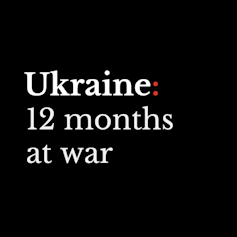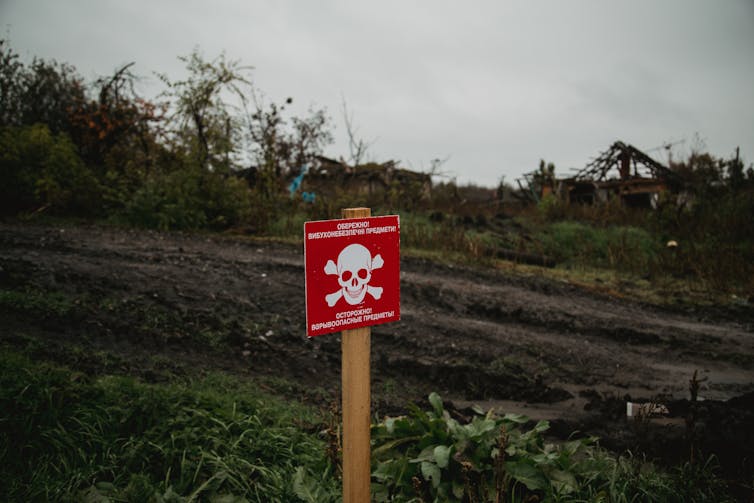Where were you when you heard that Wagner Group boss Yevgeny Prigozhin’s aircraft had crashed and he was presumed dead? For Ukraine watchers it was something of a surreal JFK moment. And, like the Zapruder tape, the video footage of the Russian mercenary group commander’s Embraer Legacy 600 private jet falling out of the sky is hard to forget.
Within minutes of the visuals emerging, journalists and other commentators were scrambling to reach conclusions: was it a bomb on board? Had the aircraft been shot from the sky? The Wagner Group boss had been travelling with colleagues from Moscow to St Petersburg: had he met with Vladimir Putin? Had they buried the hatchet over his aborted “mutiny” in June? Wasn’t he supposed to be with his troops in Belarus? What about that video of him in Africa just days before? So many questions.
Many questions remain. The Kremlin’s version of the crash was that it was just that: a crash. It took four days for official confirmation that the Wagner Group boss had been aboard the jet along with six other passengers and three flight staff. Putin’s blandly sinister reaction was that his erstwhile friend and ally was a “talented businessman” with a “complicated fate” who “made serious mistakes in his life”.
It’s unlikely that we will ever know for sure exactly what led to his death and, if – as seems likely – this was an assassination, who ordered it. But as Stefan Wolff, an expert in international relations at the University of Birmingham notes, people who seriously cross the Russian leader rarely live very long thereafter.

Since Vladimir Putin sent his war machine into Ukraine on February 24 2022, The Conversation has called upon some of the leading experts in international security, geopolitics and military tactics to help our readers understand the big issues. You can also subscribe to our fortnightly recap of expert analysis of the conflict in Ukraine.
As Wolff points out, Prigozhin’s direct challenge to Putin’s authority when he led his men out of Ukraine and across the border and on the road to Moscow, meeting with Russian military brass and receiving a rapturous welcome in the southern city of Rostov-on-Don, would have seriously irritated the Russian president. Not to mention making him look foolish, indecisive – even weak.
US president Joe Biden probably said what many of us were thinking when he gave his assessment of Prigozhin’s death: “I don’t know for a fact what happened, but I’m not surprised. There’s not much that happens in Russia that Putin’s not behind. But I don’t know enough to know the answer.”
The question as to how far Putin himself has been has weakened by this episode is an interesting one. On the one hand Prigzhin’s death may have given anyone seeking to challenge the Russian president pause for thought. On the other hand, Matthew Sussex from the Australian National University in Canberra believes that the mercenary group boss’s death after he had apparently been given reassurances as to his safety is a message to Russia’s elites that they can’t trust a word their leader says.
As Sussex writes here: “Putin’s politics of terror has a self-destructive flaw: ruling through fear and deception inevitably prompts those who might be targets (which is essentially anyone) to eventually try to change the rules of the game.”
Read more: Wagner chief Prigozhin reportedly killed, but has Putin cooked his own goose?
The Russian president was conspicuous by his absence at the Wagner Group boss’s funeral in St Petersburg this week. Prigozhin was hailed in one tribute from the “grateful people of Africa” as a “second Nelson Mandela”, which will no doubt come as a surprise to many people in the numerous African countries in which the Wagner Group has taken on contract work.
Ezenwa Olumba of Royal Holloway, University of London and Idris Mohammed of Usmanu Danfodiyo University in Sokoto, Nigeria – both scholars of conflict in Africa – have been researching countries where the Wagner Group is involved and write that: “A common denominator among these countries is the presence of insurgencies or civil wars, abundant natural resources, corrupt leadership, and unconstitutional governance.”
The Russian mercenaries, they believe, rarely act to improve the situation, tending rather to prolong the conflict, enriching themselves and their clients at the expense of the majority of the people and allegedly involving themselves in serious human rights abuses and violence.
Read more: Wagner Group: what Yevgeny Prigozhin's death means for stability in Africa
On and above the battlefield
More than 18 months into this bloody war, Ukraine is now reckoned to be one of – if not the – most mine-contaminated countries in the world. In March alone, 226 people were killed by landmines in Ukraine and 496 injured. About 30% of Ukraine is now thought to be contaminated by mines, which will take decades to clear. And, tragically, this means the deaths and injuries will continue long after the shooting stops.

Sarah Njeri, a researcher from SOAS who has spent decades in conflict resolution, peacebuilding and disarmament advocacy, has travelled widely studying the effects of landmines and other unexploded ordnance. She discusses the devastating effect they have on a country’s recovery from war, rendering vast tracts of land uninhabitable and – importantly for a country such as Ukraine which relies so much in agriculture – dangerous if not impossible to farm on.
Above the battlefield, meanwhile, some good news for Ukraine when Washington reversed its position and decided to allow countries to whom it had sold its state-of-the-art F-16 warplanes to supply them to Ukraine. At present there are about 40 aircraft being made available by Denmark and the Netherlands and more are expected to follow.
Matthew Powell, an expert in air power at the University of Portsmouth, says it will still take months to train Ukrainian pilots to handle the aircraft but once they are deployed they should give Ukraine an edge in the air. Importantly, too, their use will also give Ukraine’s airforce – and military in general – an opportunity to learn more about Nato operations as their deployment will require closer integration with Nato systems.
From hi-tech to lo-tech: Ukraine carried out a successful raid on an airfield in Kursk, western Russia last weekend using low-cost cardboard drones. The drones – or to give them their proper name, the Corvo Precision Payload Delivery Systems (PPDS) – were manufactured by Australian form Sypaq and supplied by the Australian government: 100 a month from March as part of a £15.7 million aid deal.
These lightweight drones, which cost about £2,750 apiece and are assembled from a flatpack, reportedly damaged a Mig-29 and four Su-30 fighter jets, two Pantsir anti-aircraft missile launchers, gun systems, and an S-300 air surface-to-air missile defence system. As design expert Paul Cureton of Lancaster University writes, it’s a good example of how innovative design choices can have a massive impact on warfare as military and commercial demands symbiotically spur on development.
Russia, meanwhile, is reported to have deployed a quantity of its tactical nuclear weapons in Belarus. According to a Chatham House poll conducted in June 2022, 80% of the urban population of Belarus is opposed to hosting Russian nuclear weapons. But happily for Putin, he keeps a friendly president in power there, so they don’t have much say in the matter.
As Veronika Poniscjakova, an expert in military strategy and international relations at the University of Portsmouth, writes, since the invasion of Ukraine last February, both Putin and his predecessor, Dmitry Medvedev, have regularly hinted at the possibility that Russia could, if pushed, resort to the use of its nuclear arsenal. She points to Russia’s nuclear doctrine, updated in 2020, which says that Russia would use such weapons if “aggression against the Russian Federation with the use of conventional weapons when the very existence of the state is in jeopardy”. This, she warns, could be open to a wide interpretation.
Read more: Ukraine war: the implications of Moscow moving tactical nuclear weapons to Belarus
History matters
Pope Francis ruffled more than a few feathers this week when he gave a video address to the All-Russian Meeting of Catholic Youth in St Petersburg in which he urged them not to give up on the heritage of “Mother Russia”, declaring: “You are the descendants of great Russia: the great Russia of saints, rulers, the great Russia of Peter I, Catherine II, that empire – educated, great culture and great humanity.”
Now it’s probable his emphasis was meant to be on the last bit of this statement, reminding Russian youngsters that they share in the greatness of the likes of Tolstoy, Tchaikovsky, Dostoevsky, Rachmaninoff and the like. But in Kyiv it sounded like a tone-deaf paean to two autocrats, one of whom Putin is wont to likening himself to and the other of whom invaded Crimea in the late 18th century.
Olivia Durand, of Oxford University – who has written for us several times reflecting on Putin’s use of history to justify his invasion of Ukraine – takes us through the battle for Russia’s soul, why empire and religion are so bound up with each other in the Russian psyche and why the Pope’s words would have caused such angst among Ukrainians.
Finally, to tide you over until the next recap in a fortnight, a little light reading. Russia’s War Against Ukraine: The Whole Story, by historian Mark Edele, is as he himself notes: “a book by an outsider written for outsiders”. If you are interested in finding out more about this remarkable book, read this excellent review from Marko Pavlyshyn, an emeritus professor in Ukrainian Studies at Monash University.
Ukraine Recap is available as a fortnightly email newsletter. Click here to get our recaps directly in your inbox.
This article was originally published on The Conversation. Read the original article.







